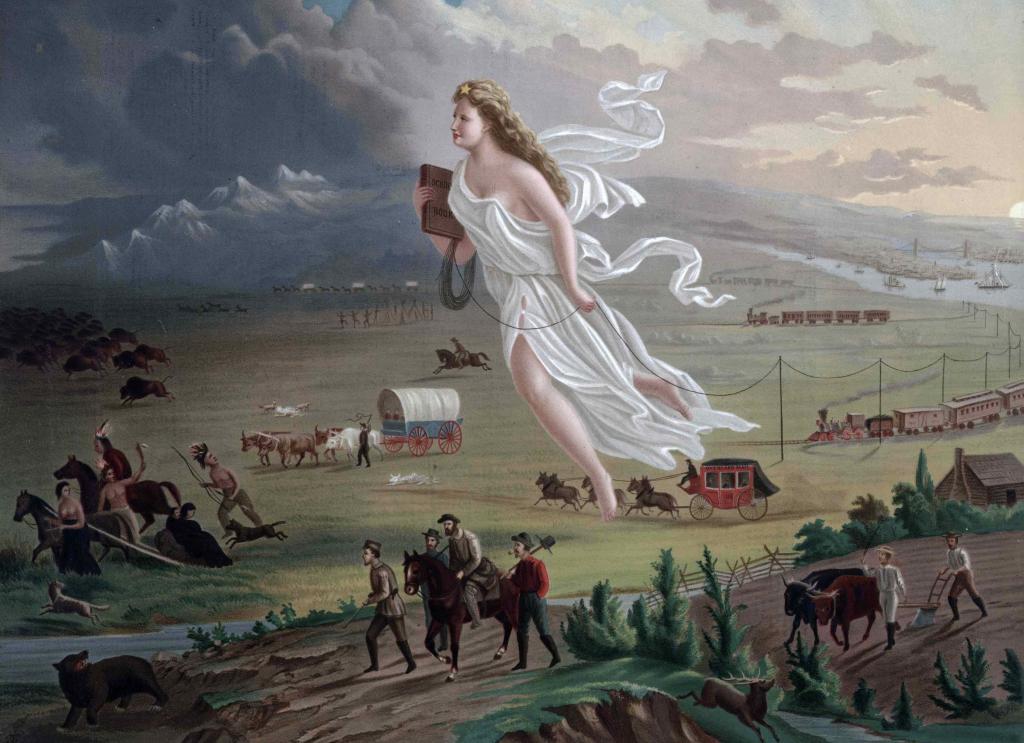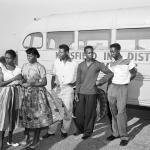I have been working on the topic of empires, and specifically on their religious dimensions. To take the title of my forthcoming book, Kingdoms of This World: How Empires Have Made and Remade Religions (Baylor University Press, 2024). I have remarked how modern-day American historians have little doubt that the US constituted an empire – not just after the grabs of Pacific territory in 1898, but essentially from the country’s foundation. (I draw your attention to the substantial bibliography that I have compiled here, and which you are welcome to download). So how does that imperial perspective affect our vision of American religious history?
To begin, what exactly is an empire, and how does it differ from a nation state? You actually could do much worse than Lord Bryce’s 1915 definition of “any wide dominion in which one nation rules other bodies of men, peoples or tribes, of diverse blood, speech and habits” (allowing for gendered language). The key elements here are those of one society extending its power over others, diversity of populations and territories, and geographical scope – while granting that “wide,” like “large,” is a relative concept. Beyond that, we really cannot find too many commonalities. Race, in any modern sense of that term, need not be a factor, nor are forms of government. The Roman world was very much an empire in a broad sense for a couple of centuries before it officially adopted that imperial label: before that it was a republic. Through most of its history, the French Empire was governed by a sequence of republics, all committed to electoral democracy, at least for the dominant population in the home country.
Nor need religion feature at all. Some empires use religion as a basis for authority, and even seek to extend the power of a particular faith at the cost of others, while others are neutral or actively hostile. Through much of its history, the French Empire was anti-clerical and often explicitly anti-religious. So was the Soviet Union that inherited all the diverse imperial territories gathered by their Tsarist Russian predecessors. God was expelled; imperial rule remained.
In the American context, religion mattered centrally. Christianity was a fundamental part of the national ideology, but of its nature, by definition, that religion was also imperial, in the sense of demanding and justifying the extension of control over new lands, and of subjugating the populations already existing there. That rhetoric is intimately familiar to any American historian, and the obvious quotes suggest themselves, from John Winthrop and Cotton Mather onward.
In 1845, John L. O’Sullivan famously justified American claims to the whole of the Oregon Territory, then hotly disputed with Great Britain: “And that claim is by the right of our Manifest Destiny to overspread and to possess the whole of the continent which Providence has given us for the development of the great experiment of liberty and federated self-government entrusted to us.” In his 1850 novel White Jacket, Herman Melville presented an imperial manifesto wholly rooted in religious rhetoric and assumptions:
And we Americans are the peculiar, chosen people – the Israel of our time; we bear the ark of the liberties of the world. Seventy years ago we escaped from thrall; and besides our first birth-right – embracing one continent of earth – God has given us for a future inheritance the broad domains of the political pagans, that shall yet come and lie down under the shade of our ark, without bloody hands being lifted. God has predestinated, mankind expects, great things from our race; and great things we feel in our souls. The rest of the nations must soon be in our rear. We are the pioneers of the world; the advance guard, sent on through the wilderness of untried things, to break a new path in the New World that is ours. In our youth is our strength; in our inexperience, our wisdom … And let us always remember that with ourselves, almost for the first time in the history of earth, natural selfishness is unbounded philanthropy; for we cannot do a good to America but we give alms to the world.
A patriotic American toast of the 1870s was “Here’s to the glorious American flag: Stars to enlighten all nations, and Stripes to flog them.”
That theme of imperial religion is well known, but it is by no means the whole of the story. Of themselves, Christian missions are certainly not just a subset of empire: but are missions conceivable without that imperial dimension, of their relation to what I have called their empire-ness? Can we study missions without knowing how empires work and think? (We can and we do, but we shouldn’t). Think of the Protestant missionary enterprise, and its relationship to racial hierarchies. But as we think this through, some other themes are no less inevitable. The demands of expanding empire also meant eliminating the rival religious forms of indigenous peoples, which commonly involved denying their religious quality. If those native peoples did not practice a religion worthy of respect, then obviously issues of “freedom of religion” were quite irrelevant.
Initially, settlers hoped to convert the new imperial subjects to become peaceful Christian neighbors, but over time, the rapid pace of occupation called for more sweeping solutions. Many scholars now apply the sizable literature on settler colonialism to the American setting, with all it implies about the destruction of indigenous communities, and their total erasure – physical, cultural, psychological, and (of course) religious. In this story, the process of imitation and appropriation – of “playing Indian” – occupies a central role.
To see the diversity of current academic approaches, look for instance at the collection of essays edited by Tisa Wenger and Sylvester A. Johnson, on Religion and US Empire: Critical New Histories (New York University Press, 2022). What follows is certainly not intended as a considered review of the book – which I found extremely useful – but rather a broad survey of the topics under discussion.
To quote the publisher’s description:
Whereas other works describe religion as a force that aided or motivated American imperialism, this comprehensive new history reveals how imperialism shaped American religion—and how religion historically structured, enabled, challenged, and resisted US imperialism. Chapters move chronologically from the eighteenth century to the twenty-first, ranging geographically from the Caribbean, Michigan, and Liberia, to Oklahoma, Hawai’i, and the Philippines.
Some of the topics are obvious enough, especially with missions. Education surfaces as a theme, as a means by which imperial authorities persuade subject peoples to accept their rule. And in the circumstances, it is not surprising to read studies of sexual and physical abuse by the would be imperial mentors. Again, any reasonable survey of the topic of Religion and US Empire inevitably addresses themes of spiritually motivated resistance, including such famous episodes as the Ghost Dance.
Of course, such an edited volume can’t touch on every possible issue, and it is a tribute to the book that it makes us think about other avenues for research. Witness how promoters of empire are even harsher to ideas or practices they see as alien or harmful, because they threaten to derail the sacred goals of that vision. You can actually make a strong argument for such an imperial reading of American anti-Catholicism, a subject on which I have written a good deal through the years. As US leaders and thinkers encountered it, Catholicism was often associated with conquered societies that were seen as doomed to decline, especially on the imperial frontiers with old Spanish and Mexican lands, and later in the Caribbean and the Philippines. Gender stereotypes played a potent role here: Catholicism was seen as fit only for the weak and womanly, Protestantism for the manly.
From the mid-nineteenth century, grim stereotypes of Irish and European immigrant Catholics made them seem unfit for the emerging American imperial race, an idea later reinforced by intelligence testing and eugenic theorizing. In contrast, Protestantism was the faith of more intellectually and biologically advanced Northern Europeans, who were society’s natural leaders, and the proper trailblazers of empire. Race, religion, and empire converged, and coalesced.
As I say, that imperial lens on American religion can be very useful. I am only beginning to explore the possibilities.














